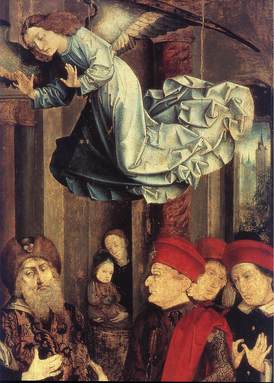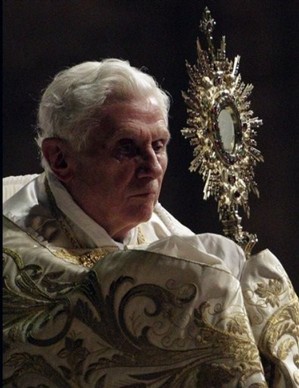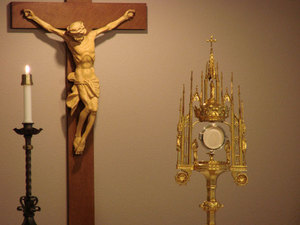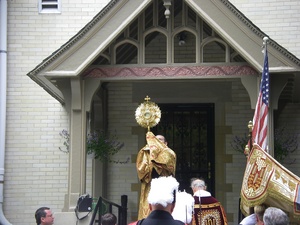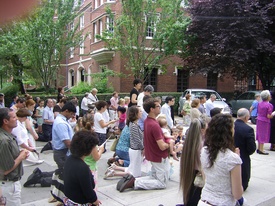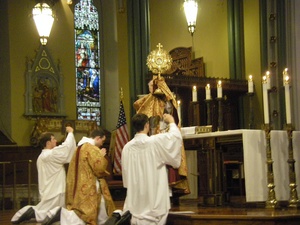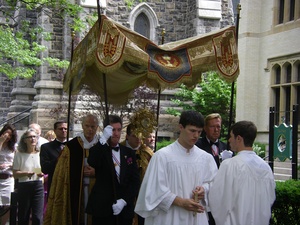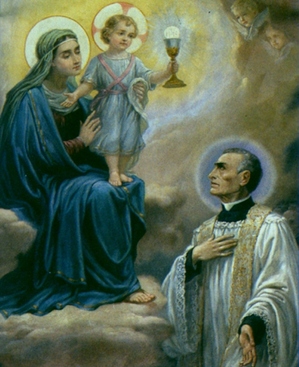 Gracious God of our ancestors, You led Peter Julian Eymard, like Jacob in times past, on a journey of faith. Under the guidance of Your gentle Spirit, Peter Julian discovered the gift of love in the Eucharist which Your Son Jesus offered for the hungers of humanity. Grant that we may celebrate this mystery worthily, adore it profoundly, and proclaim it prophetically for Your greater glory. Amen.
Gracious God of our ancestors, You led Peter Julian Eymard, like Jacob in times past, on a journey of faith. Under the guidance of Your gentle Spirit, Peter Julian discovered the gift of love in the Eucharist which Your Son Jesus offered for the hungers of humanity. Grant that we may celebrate this mystery worthily, adore it profoundly, and proclaim it prophetically for Your greater glory. Amen.
Category: Eucharist
Corpus Christi is God’s expression of love that doesn’t consume
It is only
because God himself is the eternal dialogue of love that he can speak and be
spoken to. Only because he himself is relationship can we relate to him; only
because he is love can he love and be loved in return. Only because he is
threefold can he be the grain of wheat which dies and the bread of eternal
life.
Ultimately, then, Corpus Christi is an expression of faith in God, in
love, in the fact that God is love. All that is said and done on Corpus Christi
is in fact a single variation on the theme of love, what it is and what it
does. In one of his Corpus Christi hymns Thomas Aquinas puts it beautifully:
love does not consume: it gives and, in giving, receives. And in giving it is
not used up but renews itself.
Since Corpus Christi is a confession of faith in
love, it is totally appropriate that the day should focus on the mystery of
transubstantiation. Love is transubstantiation, transformation. Corpus Christi
tells us: Yes, there is such a thing as love, and therefore there is
transformation, therefore there is hope. And hope gives us the strength to love
and face the world.
Perhaps it was good to have experienced doubts about the
meaning of celebrating Corpus Christi, for it has led us to the rediscovery of
a feast which, today, we need more than ever.
Pope Benedict XVI Benedictus
The Church can’t live without the Eucharist, Pope Benedict reminds
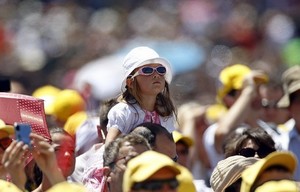 Today in Italy and other countries Corpus Domini is
Today in Italy and other countries Corpus Domini is
celebrated, the feast of the Eucharist, the Sacrament of the Body and Blood of
the Lord, which he instituted with the Last Supper and which is the Church’s
most precious treasure. The Eucharist is like the beating heart that gives life
to the whole mystical body of the Church: a social organism entirely founded on
the spiritual but concrete link with Christ. As the Apostle Paul states: “Because
there is one bread, we, although many, are one body: all of us in fact
participate in the one bread” (1 Corinthians 10:17).
Church simply would not exist. It is the Eucharist in fact that makes a human
community a mystery of communion, able to bring God to the world and the world
to God. The Holy Spirit, which transforms the bread and wine into the Body and
Blood of Christ, also transforms into members of the Body of Christ those who
receive it with faith, so that the Church is truly the sacrament of the unity
of men with God and of men with each other.
individualistic — like that in which Western societies are immersed and which
is spreading throughout the world — the Eucharist constitutes a kind of “antidote,”
which operates in the minds and hearts of believers and continually sows in them
the logic of communion, of service, of sharing, in a word, the logic of the
Gospel. The first Christians, in Jerusalem, were an evident sign of this new
way of life because they lived in fraternity and held all of their goods in
common so that no one should be indigent (cf. Acts 2:42-47). Where did all of
this come from? From the Eucharist, that is, the risen Christ, really present
with his disciples and working with the power of the Holy Spirit. And in the
succeeding generations, through the centuries, the Church, despite human limits
and errors, continued to be a force for communion in the world. We think
especially of the most difficult periods, the periods of trial: What did it
mean, for example, for countries that were under the heal of totalitarian regimes
to have the possibility to gather for Sunday Mass! As the ancient martyrs of
Abitene proclaimed: “Sine Dominico non possumus” – without the “Dominicum,” that is, the Sunday Eucharist, we cannot live. But the
void produced by false freedom can be dangerous, and so communion with the Body
of Christ is a medicine of the intellect and will to rediscover taste for the
truth and the common good.
my predecessor, Blessed John Paul II defined as a “Eucharistic woman”
(Ecclesia de Eucharistia, 53-58). In her school our life too becomes fully “Eucharistic,”
open to God and to others, able to transform evil into good by the power of
love, which fosters unity, communion, fraternity.
Corpus Christi in Rome 2011
The feast of Corpus Domini is inseparable from the Holy
Thursday Mass of in Caena Domini, in which the institution of the Eucharist is
also celebrated. While on the evening of Holy Thursday we relive the mystery of
Christ who offers himself to us in the bread broken and wine poured out, today,
in celebration of Corpus Domini, this same mystery is proposed to the adoration
and meditation of God’s people, and the Blessed Sacrament is carried in
procession through the streets of towns and villages, to show that the risen
Christ walks among us and guides us towards the Kingdom of heaven. Today we
openly manifest what Jesus has given us in the intimacy of the Last Supper,
because the love of Christ is not confined to the few, but is intended for all.
This year during the Mass of Our Lord’s Last Supper on Holy Thursday, I pointed
out that the Eucharist is the transformation of the gifts of this land – the
bread and wine – intended to transform our lives and usher in the
transformation of the world. Tonight I would like to return to this point of
view.
Everything starts, you might say, from the heart of Christ, who at the
Last Supper on the eve of his passion, thanked and praised God and, in doing
so, with the power of his love transformed the meaning of death which he was
about to encounter. The fact that the Sacrament of the altar has taken on the
name “Eucharist” – “thanksgiving” – expresses this: that
the change in the substance of the bread and wine into the Body and Blood of
Christ is the fruit of the gift that Christ made of himself, a gift of a love
stronger than death, love of God which made him rise from the dead. That is why
the Eucharist is the food of eternal life, the Bread of life. From the heart of
Christ, from his “Eucharistic Prayer” on the eve of his passion,
flows the dynamism that transforms reality in its cosmic, human and historical
dimensions. All proceeds from God, from the omnipotence of his love One and
Triune, incarnate in Jesus. In this Love the heart of Christ emerges, so He
knows how to thank and praise God even in the face of betrayal and violence, and
thus changes things, people and the world.
Mike Aquilina speaks on the Mass: From the Old Covenant to the New
Continue reading Mike Aquilina speaks on the Mass: From the Old Covenant to the New
Adoratio 2011: From Adoration to Evangelization
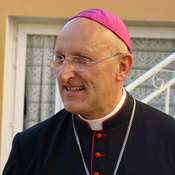 The Most Reverend Dominique Rey, Bishop of Fréjus-Toulon, announced today that he is sponsoring an international conference on Eucharistic Adoration to be held in Rome, Italy, 20-23 June 2011: Adoratio 2011: From Adoration to Evangelization.
The Most Reverend Dominique Rey, Bishop of Fréjus-Toulon, announced today that he is sponsoring an international conference on Eucharistic Adoration to be held in Rome, Italy, 20-23 June 2011: Adoratio 2011: From Adoration to Evangelization.
Church of Canada priestess gives communion to a dog
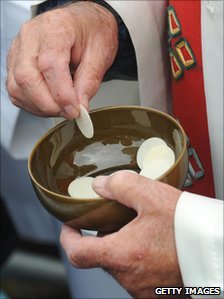 AND you wonder why fewer and fewer people take the Anglican Church (or the Episcopal Church if you are American) with a degree of seriousness. Recently a Church of Canada priestess gave communion to a German Shepherd as a “simple church act of reaching out.” What a gesture of welcome! This act is not only contravening “church policy” as much as it is an acknowledgement that the real Presence of Christ is not a Reality for these people. Policy is has nothing to do with it, does it? But if the Anglicans of the Church of Canada simply believe Communion is a symbol or that it represents something else…. Sounds like Joseph Campbell, Derida and many Protestant theologians (e.g. Borg, Tillich and Bultmann) are patron saints of mere symbol and not of Jesus Christ, body and blood, soul and divinity.
AND you wonder why fewer and fewer people take the Anglican Church (or the Episcopal Church if you are American) with a degree of seriousness. Recently a Church of Canada priestess gave communion to a German Shepherd as a “simple church act of reaching out.” What a gesture of welcome! This act is not only contravening “church policy” as much as it is an acknowledgement that the real Presence of Christ is not a Reality for these people. Policy is has nothing to do with it, does it? But if the Anglicans of the Church of Canada simply believe Communion is a symbol or that it represents something else…. Sounds like Joseph Campbell, Derida and many Protestant theologians (e.g. Borg, Tillich and Bultmann) are patron saints of mere symbol and not of Jesus Christ, body and blood, soul and divinity.
Theme for Week of Prayer for Christian Unity 2011 announced
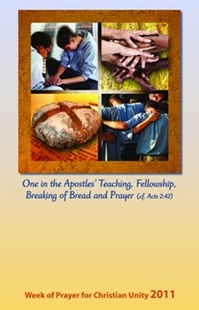 Each year the Week of Prayer for Christian Unity has a theme and the theme for the 2011 observance of the Week of Prayer is One in the Apostles’ Teaching, Fellowship, Breaking of Bread and Prayer.
Each year the Week of Prayer for Christian Unity has a theme and the theme for the 2011 observance of the Week of Prayer is One in the Apostles’ Teaching, Fellowship, Breaking of Bread and Prayer.
Christ abides with us forever in the Eucharist
Just as Holy Thursday and then Corpus Christi focuses our attention on the beauty of Christ’s fulfillment of His promise to remain with us –in the Holy Eucharist– so every Thursday ought to be a day of special prayer (time spent in adoration, Mass, confession of sins, reflection using the works of “eucharistic saints”). And this is the point of this blog: sharing in Communio lived with Christ in the Church among all people. But to the point here, I think any time spent with the Blessed Sacrament “touches eternity, highlighting the relationship between the Eucharistic banquet (the Mass) and the eschatological banquet in the Father’s Kingdom (heaven)” (GIRM 281).
Corpus Christi procession at St Mary’s New Haven
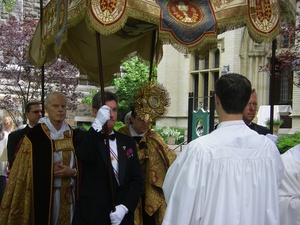 O sacred Banquet in which Christ is received, the memory of His Passion is recalled, the mind is filled with grace, and pledge of future glory is given to us.
O sacred Banquet in which Christ is received, the memory of His Passion is recalled, the mind is filled with grace, and pledge of future glory is given to us.
